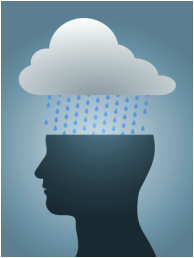Meds
If you choose to use medications, it is important for you to find a medical professional who specializes in teens or adolescents as their bodies are still developing and some medications can have harmful side effects.
There are many types of medications, and listed below are a few of the ones used for teens, their positive attributes and their side effects. This is not a comprehensive list of all of them as the list is constantly changing. Medication for depression is not an exact science for any population, and teens add an interesting twist.
The particular drugs listed work to make sure will there be a stable amount of Serotonin in our body. Serotonin is a chemical that works with our behaviors, thoughts and feelings. When there is a decreased amount of Serotonin it is believed that depression can occur.
Teens Finding Hope does not advocate for medication or a particular drug. This is a personal choice and one that you should make with your team and child. Both authors have chosen to use medications and have experienced many of the following prescriptions with differing benefits and side effects.
Develop a good partnership with your medical professional and include your teen as they can tell you what they feel when they take the medication. Just because the medication does not list a side effect, does not mean it won’t affect your teen in a particular way. Listen to them. This is scary when you look at the possible side effects. That is why it is key to have someone you trust and is knowledgeable on your team. Several of the medications take weeks or months to take effect. Some require blood or urine tests. Sometimes doctors will need to combine medications to treat multiple issues with your child. If you don’t get the right medication or dose right away, keep trying. There is hope and life can get better.
There are many kinds of drugs for treating depression and we have listed only a few categories. Please work with your medical professional to find the exact match for your child. Remember: this process can take months or longer to find the right combination to benefit your teen.
The list below includes Noradrenergic and specific serotonergic antidepressants (NaSSAs), Norepinephrine reuptake inhibitors (NRIs), and Norepinephrine-dopamine reuptake inhibitors (NDRIs) that try to increase the levels or neurotransmitters by blocking other receptors. Each comes with benefits and side effects which is why it is imperative to meet with a medical professional to come up with the best plan.
There are many types of medications, and listed below are a few of the ones used for teens, their positive attributes and their side effects. This is not a comprehensive list of all of them as the list is constantly changing. Medication for depression is not an exact science for any population, and teens add an interesting twist.
The particular drugs listed work to make sure will there be a stable amount of Serotonin in our body. Serotonin is a chemical that works with our behaviors, thoughts and feelings. When there is a decreased amount of Serotonin it is believed that depression can occur.
Teens Finding Hope does not advocate for medication or a particular drug. This is a personal choice and one that you should make with your team and child. Both authors have chosen to use medications and have experienced many of the following prescriptions with differing benefits and side effects.
Develop a good partnership with your medical professional and include your teen as they can tell you what they feel when they take the medication. Just because the medication does not list a side effect, does not mean it won’t affect your teen in a particular way. Listen to them. This is scary when you look at the possible side effects. That is why it is key to have someone you trust and is knowledgeable on your team. Several of the medications take weeks or months to take effect. Some require blood or urine tests. Sometimes doctors will need to combine medications to treat multiple issues with your child. If you don’t get the right medication or dose right away, keep trying. There is hope and life can get better.
There are many kinds of drugs for treating depression and we have listed only a few categories. Please work with your medical professional to find the exact match for your child. Remember: this process can take months or longer to find the right combination to benefit your teen.
The list below includes Noradrenergic and specific serotonergic antidepressants (NaSSAs), Norepinephrine reuptake inhibitors (NRIs), and Norepinephrine-dopamine reuptake inhibitors (NDRIs) that try to increase the levels or neurotransmitters by blocking other receptors. Each comes with benefits and side effects which is why it is imperative to meet with a medical professional to come up with the best plan.
SSRI: Selective Serotonin Reuptake Inhibitors
These can be recommended over other drugs, as they may have fewer side effects and can be milder. SSRIs Increase levels of neurotransmitters (serotonin) in between synapses of two nerves
Positives: Fewer side effects than tricyclic/tetracyclic anti-depressents. These side effects may include: sleepiness, or sleeplessness, weight gain, decreased appetite, dry mouth, adverse effects on the heart, etc. 60-70% improve when taking SSRI’s. Drawbacks:
Things to Remember about SSRI’s:
|
MAOI: Monoamine Axidase Inhibitors
*Prevents the breakdown of messages of serotonin and dopamine in nerves, so when they are released, they are released at a much higher level
Positives: Particularly helpful in decreasing/maintaining overeating, fatigue, irritability, high levels of anxiety, and high levels of impulse controls. These are symptoms of an “atypical” depression.
Drawbacks:
Things to remember about MAOI’s:
|
Serotonin-Norepinephrine Reuptake Inhibitors (SNRIs)
These drugs are similar to SSRIs. They target the neurotransmitter norepinephrine and inhibit the re-uptake of norepinephrine allowing a balance to be created in your body.
Drawbacks: May experience withdrawal and will need to taper amount when discontinuing use. Share similar side effects with SSRIs. |
Find more facts...
Depression statistics and information was found in the following:
National Institute for Mental Health (NIMH)
World Health Organization (WHO)
National Alliance for the Mentally Ill (NAMI)
Suicide Awareness Voices of Education [online] National Mental Health Association,“Fact Sheet: Suicide”
depressionstats.com
teendepression.org
National Institute for Mental Health (NIMH)
World Health Organization (WHO)
National Alliance for the Mentally Ill (NAMI)
Suicide Awareness Voices of Education [online] National Mental Health Association,“Fact Sheet: Suicide”
depressionstats.com
teendepression.org


